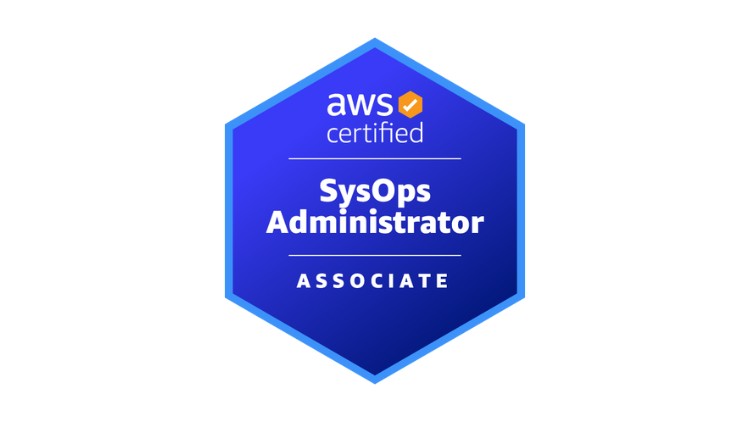
Test Your Knowledge & Get Exam-Ready for the AWS SysOps Administrator Associate Certification
⭐ 5.00/5 rating
👥 2,192 students
🔄 July 2025 update
Add-On Information:
Note➛ Make sure your 𝐔𝐝𝐞𝐦𝐲 cart has only this course you're going to enroll it now, Remove all other courses from the 𝐔𝐝𝐞𝐦𝐲 cart before Enrolling!
- Course Overview
- This top-rated ‘AWS Certified SysOps Administrator – Associate Prep Exam’ course offers your direct route to mastering AWS operational excellence and acing the certification. With an outstanding 5.00/5 rating from 2,192 students and content updated for July 2025, you’re assured of relevant and effective preparation.
- Designed for those ready to “Test Your Knowledge & Get Exam-Ready,” the curriculum immerses you in the core duties of a SysOps Administrator. Focus areas include deploying, managing, and maintaining secure, scalable AWS environments through practical, scenario-based learning.
- You’ll explore critical operational domains: monitoring, logging, incident response, security, and performance optimization. Learn to build and manage highly available, fault-tolerant systems, troubleshoot complex issues, and leverage automation for efficiency. This systematic approach prepares you comprehensively for both the exam and real-world cloud operations.
- Requirements / Prerequisites
- A foundational understanding of key AWS services like EC2, S3, VPC, and IAM is highly recommended. While not mandatory, prior AWS Certified Cloud Practitioner or Solutions Architect – Associate certification is beneficial.
- Familiarity with operating system command-line interfaces (Linux/Windows) is expected for system-level interaction and troubleshooting.
- Basic knowledge of networking concepts, including IP addressing, subnets, routing, and DNS, is crucial for understanding AWS networking.
- Active participation in hands-on labs and practical exercises is essential to solidify theoretical knowledge and gain practical skills.
- Skills Covered / Tools Used
- Deployment and Resource Management: Master AWS CloudFormation for Infrastructure as Code, configure Auto Scaling Groups, and deploy Elastic Load Balancers (ELB). Utilize AWS Systems Manager (SSM) for instance management, patch automation, and compliance.
- Monitoring, Logging, and Alerting: Implement Amazon CloudWatch for metrics, alarms, and dashboards. Collect/analyze logs with CloudWatch Logs, audit API calls via CloudTrail. Understand VPC Flow Logs and efficient S3 log storage.
- Security and Compliance: Implement robust IAM policies/roles. Configure Security Groups/NACLs. Explore AWS WAF, AWS Config for auditing, and AWS Key Management Service (KMS) for data encryption.
- Networking and Connectivity: Configure advanced VPC setups (VPNs, Direct Connect gateways, Transit Gateway). Manage DNS with Amazon Route 53 and understand NAT Gateways for outbound access.
- High Availability, Fault Tolerance, and Disaster Recovery: Design resilient architectures with Multi-AZ deployments. Implement cross-region replication for S3/Aurora. Utilize Elastic File System (EFS) and ensure robust backup/restore for RDS/EBS.
- Data Management: Optimize storage costs using S3 lifecycle policies and Glacier. Automate EBS snapshots and understand DynamoDB backup strategies.
- Cost Optimization and Billing: Monitor AWS spend with Cost Explorer, budgeting tools, and billing alarms. Leverage Reserved Instances and Savings Plans for efficiency.
- Incident Response and Automation: Develop proactive incident response using CloudWatch Alarms/AWS Config rules. Implement automation with AWS Lambda, AWS Step Functions, and CloudWatch Events.
- Tools Used: Gain proficiency with the AWS Management Console, AWS Command Line Interface (CLI), and working with CloudFormation templates to provision and manage AWS resources effectively.
- Benefits / Outcomes
- Achieve Certification: Successfully pass the AWS Certified SysOps Administrator – Associate exam, validating your operational expertise.
- Master Practical Skills: Develop real-world abilities in managing, operating, and troubleshooting AWS environments.
- Apply Operational Best Practices: Implement industry standards for security, scalability, reliability, and cost-efficiency in AWS.
- Enhance Career Prospects: Boost your profile for roles like Cloud Operations Engineer, DevOps Specialist, or AWS Administrator.
- Build Troubleshooting Confidence: Gain the ability to diagnose and resolve complex operational issues efficiently.
- Automate for Efficiency: Become proficient in automating routine tasks, increasing agility and reducing errors.
- PROS
- Exam-Focused Preparation: Directly aligns with the AWS SysOps Administrator – Associate exam blueprint, offering highly relevant content.
- Proven Effectiveness: Backed by a perfect 5.00/5 rating from 2,192 students, demonstrating high satisfaction.
- Current Content: Regularly updated, including the July 2025 update, ensuring the latest AWS features and exam objectives.
- Hands-On Learning: Emphasizes practical labs and real-world scenarios for solidifying knowledge.
- Expert-Led: Instruction from experienced AWS professionals provides valuable insights and best practices.
- CONS
- Requires Prior AWS Foundation: Not suitable for absolute beginners; some existing knowledge of core AWS services is expected.
Learning Tracks: English,IT & Software,IT Certifications
Found It Free? Share It Fast!